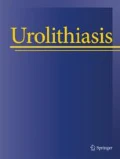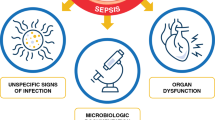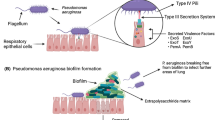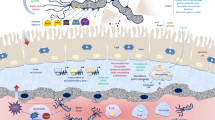Abstract
Urinary tract infection (UTI), most frequently caused by Escherichia coli, is one of the most common bacterial infections in humans. It is a host inflammatory response to bacterial invasion in which large numbers of neutrophils are recruited into the bladder in response to cytokines secreted by the infected bladder epithelium. We hypothesise that an impaired host neutrophil response leads to susceptibility to recurrent UTI (rUTI). Therefore, the neutrophil inflammatory response of patients with a history of rUTI was compared to healthy controls. No difference in neutrophil adhesion receptor expression or complement receptor expression following bacterial stimulus was detected between the two groups. However, the expression of the IgG receptor CD16, bacterial phagocytosis and reactive oxygen intermediate (ROI) production were significantly reduced in UTI patient neutrophils compared to controls. Neutrophils from rUTI patients have a significantly reduced bactericidal function when compared to healthy controls, with the former showing a reduced capacity for activation. This reduced neutrophil function may result in defective bacterial clearance and lead to susceptibility to recurrent infection.






Similar content being viewed by others
References
Abrutyn E, Berlin J, Mossey J, Pitsakis P, Levison M, Kaye D (1996) Does treatment of asymptomatic bacteriuria in old ambulatory women reduce subsequent symptoms of urinary tract infections? J Am Geriatr Soc 44:293
Barry MC, Condron CM, Watson RW, Redmond HP, El Jack M, Watson RG, Bouchier Hayes D (1997). Pre-operative neutrophil and monocyte activation state predicts post-operative neutrophil and monocyte function. Eur J Surg 163: 739
Butcher EC (1991) Leukocyte-endothelial cell recognition: three (or more) steps to specificity and diversity. Cell 67: 1033
Carlson KJ, Mulley AG (1986) Management of acute dysuria a decision analysis model of alternative strategies. Ann Intern Med 102: 244
Condron C, Neary P, Toomey D, Redmond HP, Bouchier-Hayes D (2003) Taurine attenuates calcium-dependent, Fas-mediated neutrophil apoptosis. Shock 19: 564
Demeters PA, Lo SK, Olsen-Egbert E, Wlaz A, Baggiolini M, Cohn ZA (1990) Neutrophil activating protein/interleukin-8 stimulates the binding activity of leukocyte adhesion receptor CD11b/CD18 on human neutrophils. J Exp Med 171: 1155
Durand V, Pers JO, Renaudineau Y, Saraux A, Youinou P, Jamin C (2000) Differential effects of anti-Fc gamma RIIIb autoantibodies on polymorphonuclear neutrophil apoptosis and function. J Leukoc Biol 69: 233
Eaton JW (1993) Defences against hypochlorous acid: parrying the neutrophil's rapier trust. J Lab Clin Med 121: 197
Frendeus B, Godaly C, Hang L, Karpman D, Svaborg C (2001) Interleukin-8 receptor deficiency confers susceptibility to acute pyelonephriris. J Infect Dis 183 (Suppl): S56
Gargan RA, Hamilton-Miller JM (1994) Opsonophagocytosis in infected urine: relation to pH and osmolality. J Urol 152: 1615
Gargan RA, Hamilton-Miller JM, Brumfitt W (1993) Effect of pH and osmolality on in vitro phagocytosis and killing by neutrophils in urine. Infect Immun 61: 8
Granger DN, Kubes P (1994) The microcirculation and inflammation: modulation of leukocyte-endothelial cell adhesion. J Leukoc Biol 55: 662
Haraoka M, Hang L, Frendeus B, Giodaly G, Burdick M, Strieter R, Svanborg C (1999) Neutrophil recruitment and resistance to mucosal infection with uropathogenic Escherichia coli. J Infect Dis 180: 1220
Hedges S, Agace W, Svensson M, Sjogren AC, Ceska M, Svanborg C (1994) Uroepithelial cells are part of a mucosal cytokine network. Infect Immun 62: 2315
Hopkins WJ, Heisey DM, Lorentzen DF, Uehling DT (1998) A comparative study of major histocompatibility complex and red blood cell antigen phenotypes as risk factors for recurrent urinary tract infections in women. J Infect Dis 177: 1296
Kansas GS (1996) Selectins and their ligands: current concepts and controversies. Blood 88: 3259
Kishimoto TK, Jutila MA, Berg EL, Butcher EC, (1989) Neutrophil Mac-1 and MEL-14 adhesion proteins inversely regulated by chemotactic factors. Science 245: 1238
Kobayashi T, Van der Pol WL, Van de Winkel JG, Hara K, Sugita N, Westerdaal NA, Yoshie H, Horigome T (2000) Relevance of IgG receptor IIIb (CD16) polymorphism to handling of Porphyromonas gingivalis: implications for the pathogenesis of adult periodontitis. J Periodont Res 35: 65
Kunin CM (1994) Urinary tract infections in females. Clin Infect Dis 18:
Lefer AM (1999) Role of the beta2-integrins and immunoglobulin superfamily members in myocardial ischemia-reperfusion. Ann Thorac Surg 68: 1920
Mulvey MA, Schilling JD, Martinez JJ, Hultgren SJ ((2000) Bad bugs and beleagured bladders; interplay between uropathogenic Escherichia coli and innate host defenses. Proc Natl Acad Sci U S A; 97: 8747
Nishimura H, Gogami A, Miyagawa Y, Nanbo A, Murakami Y, Baba T, Nagasawa S (2001) Bactericidal/permeability-increasing protein promotes complement activation for neutrophil-mediated phagocytosis on bacterial surface. Immunology 103: 519
Schaeffer AJ, Jones JM, Dunn JK (1981) Association of in vitro Escherichia coli adherence to vaginal and buccal epithelial cells with susceptibility of women to recurrent urinary tract infections. N Engl J Med 304: 1062
Schaeffer AJ , Radvany RM, Chmiel JS, (1993) Human leukocyte antigen in women with recurrent urinary tract infections. J Infect Dis 148: 604
Kubo S, Matsumoto T, Sakumoto M, Mochida O, Abe Y, Kumazawa J (1998) Effect of urine components on leukocyte chemiluminescence response. Renal Failure 20: 75
Stamey TA, (1975) The role of introital enterobacteria in recurrent urinary infections. J Urol 109: 467
Stapleton AE, Stroud MR, Hakomori SJ, Stamm WE, (1998) The globoseries glycosphingolipid sialosyl galactosyl globoside is found in urinary tract tissues and is a preferred binding receptor in vitro for uropathogenic Escherichia coli expressing pap-encoded adhesions. Infect Immun 66: 3856
Sugita N, Kobayashi T, Ando Y, Yoshihara A, Yamamoto K, Van de Winkel JG, Miyazaki H, Yoshie H (2001) Increased frequency of Fc gamma RIIIb-NA1 allele in periodontitis-resistant subjects in an elderly Japanese population. J Dent Res 80: 914
Svanborg C. Godaly G (1997) Bacterial virulence in urinary tract infection Infect. Dis Clin N Am 11: 513
Svanborg C, Bergsten G, Fischer H, Frendeus B, Godaly G, Gustafsson E, Hang L, Hedlund M, Karpman D, Lundstedt AC, Samuelsson M, Samuelsson P, Svensson M, Wullt B (2001) The 'innate' host response protects and damages the infected urinary tract. Ann Med 33: 563
Svanborg-Eden C, Hagberg L, Briles D, McGhee J, Michalek S (1985) Susceptibility to Escherichia coli urinary tract infection and LPS responsiveness. In: Skamene E (ed) Genetic control of host resistance to infection and malignancy, vol 3. Alan R.Liss, New York, p 385
Tambic A, Kes P, Milutinovic S, Rabatic S, Silobrcic V, (1992) Phagocytic function in patients with recurrent urinary tract infections. Acta Med Croat 46: 21
Taniuchi S, Masuda M, Yamamoto A, Hasui M, Tsuji S, Komiyama Y, Takahashi H, Kobayashi Y (2001) FcgammaRIII b and FcgammaRIIa polymorphism may affect the production of specific NA1 autoantibody and clinical course of autoimmune neutropenia of infancy. Hum Immunol 62: 408
Walcheck B, Kahn J, Fisher JM, Wang BB, Fisk RS, Payan DG, Feehan C, Betageri R, Darlak K, Spatola AF, Kishimoto TK (1996) Neutrophil rolling altered by inhibition of L-selectin shedding in vitro. Nature 380: 720
Wang JH, Redmond HP, Watson RGW, Bouchier-Hayes D (1995) Restoration of 'tired' neutrophil function by aproptinin is dependant on the presence of taurine. Surg Forum 45: 573
Wang JH, Redmond HP, Watson RW, Condron C, Bouchier-Hayes D (1996) The beneficial effect of taurine on the prevention of human endothelial cell death. Shock 6: 331
Acknowledgements
This work was funded by the Department of Surgery, Royal College of Surgeons in Ireland.
Author information
Authors and Affiliations
Rights and permissions
About this article
Cite this article
Condron, C., Toomey, D., Casey, R.G. et al. Neutrophil bactericidal function is defective in patients with recurrent urinary tract infections. Urol Res 31, 329–334 (2003). https://doi.org/10.1007/s00240-003-0344-z
Received:
Accepted:
Published:
Issue Date:
DOI: https://doi.org/10.1007/s00240-003-0344-z




